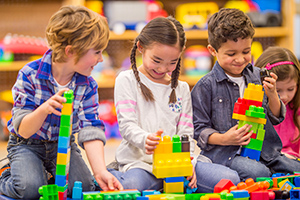Helping Children Develop Social Skills

When we see our children struggling to make friends or get along in groups, we are often perplexed about how to best help them develop social skills.
“So many of the children I see in counseling have the same problem—feeling left out and lonely,” Cathi Cohen, LCSW, a certified group psychotherapist, writes for Attention magazine in Raise Your Child’s Social IQ—How to Help When ADHD Impacts People Skills. “Feeling alone and disconnected from peers is a distressing thing for a child to experience. And it’s not only the children who suffer. As parents, you also feel frustrated and hopeless at not knowing how to help your children make the friends they so strongly desire. Children affected by ADHD in particular, have unique social challenges that frequently get in the way of acquiring good social skills.”
Taylor and Brendan: Helping children develop social skills
“While Taylor usually makes a good first impression when she meets other children, it’s extremely hard for her to develop lasting friendships,” Ms. Cohen says. “Time and time again, instead of ending up with a group to play with, Taylor winds up playing alone. Brendan talks nonstop in class, preventing others from getting their work done. His desk is such a mess that his stuff always ends up on other classmates’ desks. He blurts out answers in class, which frustrates the teacher. Brendan doesn’t understand why the kids in class won’t talk to him. Brendan comes home most days feeling hurt and confused.”
Brendon isn’t trying to annoy his classmates and Taylor doesn’t realize her demanding behaviors are driving her peers away, Ms. Cohen says. Her goal became creating a social skills training program to help the children identify their behaviors and then put in place new behaviors to attract and maintain friendships.
“Kids with ADHD often struggle to stay tuned in to their environments; they frequently misread social signals,” Ms. Cohen says. “Misinterpretations may lead to overreacting to ambiguous social situations. They can also lead to under-reacting. The kids who don’t see these signals may be insensitive to the feedback cues others are giving them, leading to anger from peers who feel that their ‘social hints’ are being ignored.”
Teaching children new skills
Ms. Cohen says parents can be their children’s social skills coaches when it come to identifying and mastering new skills.
“Your involvement as a parent is essential to help your child learn new skills and use them in a variety of settings,” she says. “You already help your child to develop social skills by modeling good social skills yourself and by creating situations in which your child can practice.”
- Talk to your child about the need for social skills. Discuss the importance of making friends and getting along with others. Tell your child you are going to try to help him or her learn the skills needed to be “an even better friend than he or she already is.”
- Set a social goal with your child. It’s important to be as specific as possible when setting a goal, and to set only one goal at a time. The goal must be a goal that your child sees as important.
- Carefully arrange a supervised, time-limited playdate for your child to spend with other children to practice newly learned social skills. Make sure the date ends on a positive note whenever possible. Children tend to remember more vividly the last 15 minutes of an interaction.
- Choose play activities that are simple and enticing. Keep the activities easy in terms of attention span and stimulation. These occasions minimize the need for intense social interaction, and thus increase the likelihood of social success for your child with ADHD.
- Record your child at home. Sometimes children affected by ADHD have trouble seeing themselves through others’ eyes. Review these videos with your child to increase self-observation and awareness.
- Prompt your child to think about the feelings and reactions of others. Help your child understand the motivations and feelings of others by observing out loud what others’ faces and bodies are telling us.
—From Raise Your Child’s Social IQ—How to Help When ADHD Impacts People Skills
Looking for resources?
Ms. Cohen says more social skills groups for children are popping up around the country and suggests children can benefit from working in one of these groups.
“The group becomes a microcosm for the social arena at school or in the neighborhood. Group members act as mentors for each other,” Ms. Cohen says. “They practice skills together through role play, give each other positive feedback and constructive criticism, and gain strength from knowing that they are not alone with their social struggles.”
To find a hospital or university center that sponsors an ADHD social skills group, check the ADHD Centers Resource page.
Other resources:
- Webinar: What to Know, Say & Do: Helping Parents & Kids Understand the Social & Emotional Aspects of ADHD
- Webinar: 5 Solutions to Common ADHD Social Struggles
- Tips for Parents: Helping Your Child Develop Social Skills
Join the discussion: How do you help your child practice social skills?
